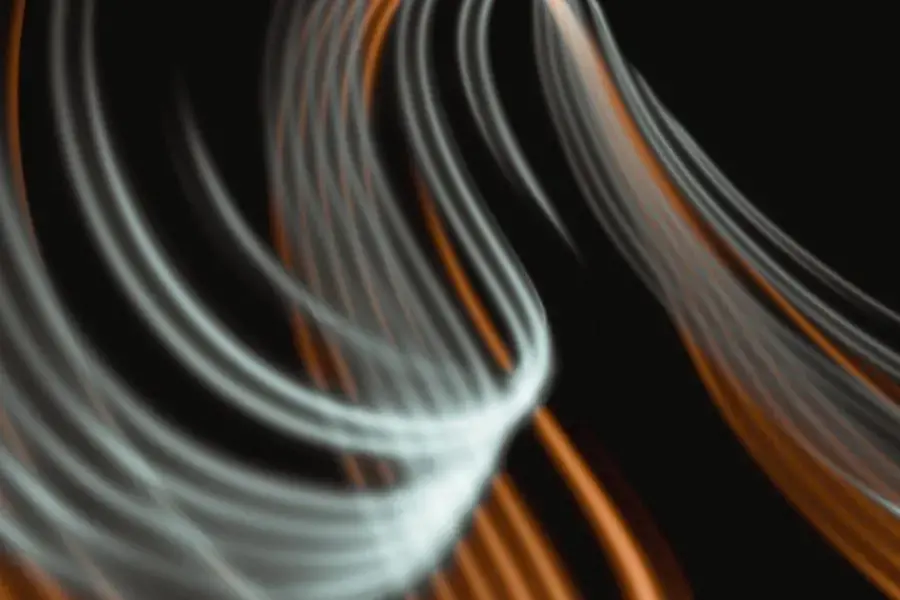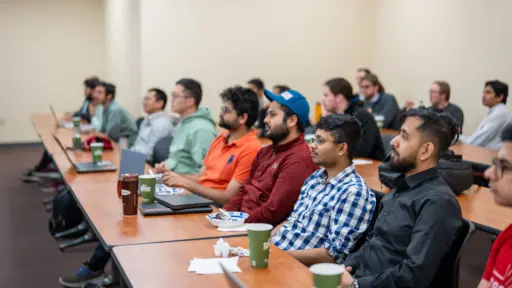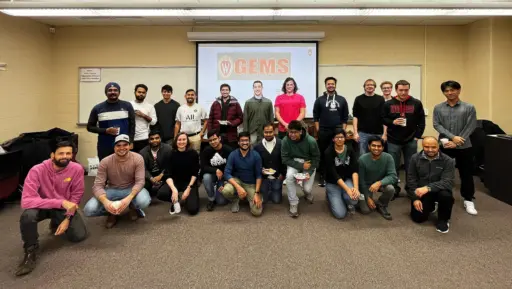DEGREE Engineering Mechanics, PhD

Doctoral degree in engineering mechanics
As a PhD student in engineering mechanics, you’ll delve deeper into several main areas of the mechanics of materials and astronautics: continuum mechanics, computational mechanics, dynamics and vibration, fluid mechanics, nanomechanics, solid mechanics, and biomechanics. Additionally, you can add breadth to your education with a minor in a number of related fields, including civil and environmental engineering, chemical and biological engineering, electrical and computer engineering, materials science, mechanical engineering, nuclear engineering and engineering physics, physics, geological engineering and geology, mathematics, statistics, and computer science.
At a glance
Mechanical engineering department
Learn more about what information you need to apply.
Admissions
Please consult the table below for key information about this degree program’s admissions requirements. The program may have more detailed admissions requirements, which can be found below the table or on the program’s website.
Graduate admissions is a two-step process between academic programs and the Graduate School. Applicants must meet the minimum requirements of the Graduate School as well as the program(s). Once you have researched the graduate program(s) you are interested in, apply online.
| Fall Deadline | December 15 |
| Spring Deadline | September 1 |
| Summer Deadline | December 15 |
| GRE (Graduate Record Examinations) | Not required.* |
| English Proficiency Test | Every applicant whose native language is not English, or whose undergraduate instruction was not exclusively in English, must provide an English proficiency test score earned within two years of the anticipated term of enrollment. Refer to the Graduate School: Minimum Requirements for Admission policy: https://policy.wisc.edu/library/UW-1241. |
| Other Test(s) (e.g., GMAT, MCAT) | n/a |
| Letters of Recommendation Required | 3 |
- *
Submitted scores will not be used in admission decisions.
Application Requirements and Process
Degree
For admission to graduate study in Engineering Mechanics, an applicant must have a bachelor’s degree in engineering, mathematics, or physical science, and an undergraduate record that indicates an ability to successfully pursue graduate study. International applicants must have a degree comparable to a regionally accredited US bachelor’s degree.
It is highly recommended that students take courses that cover the same material as these UW-Madison courses before entering the program:
| Advanced Mathematics | 3 | |
| Techniques in Ordinary Differential Equations | ||
or MATH 320 | Linear Algebra and Differential Equations | |
or MATH 321 | Applied Mathematical Analysis | |
| Linear Algebra and Matrices | 3 | |
| Linear Algebra and Differential Equations | ||
or MATH 340 | Elementary Matrix and Linear Algebra | |
| Mechanics of Materials | 3 | |
| Mechanics of Materials | ||
| Dynamics | 3 | |
| Dynamics | ||
or PHYSICS 311 | Mechanics | |
Descriptions of course content can be accessed through Guide. Students may enter without having taken these courses. However, in such cases the students must inform their advisors, who will help them plan courses of study that will provide adequate background for our department’s graduate curriculum.
All applicants must satisfy requirements that are set forth by the Graduate School.
GPA
The Graduate School requires a minimum undergraduate grade point average of 3.0 on a 4.0 scale on the equivalent of the last 60 semester hours from the most recent bachelor’s degree or a master’s degree with a minimum cumulative GPA of 3.0 on a 4.0 scale.
PhD advisor selection process
Applicants are encouraged to identify potential faculty advisors and seek a confirmation. Please review the department Research and People websites and contact those whose research interests align with yours. Only faculty members listed with the titles of Assistant Professor, Associate Professor, or Professor, can serve as graduate advisors. Do not contact Emeritus faculty, Lecturers, Research Scientists, or Faculty Associates. You are also encouraged to inquire about possible funding opportunities. If a faculty member agrees to be your advisor, ask the person to email an acknowledgment to emgradadmission@engr.wisc.edu.
Application Materials
Each application must include the following:
- Graduate School Application
- Academic transcripts
- Statement of purpose
- Resume/CV
- Three letters of recommendation
- English Proficiency Score (if required)
- Application Fee
Academic Transcript
Within the online application, upload the undergraduate transcript(s) and, if applicable, the previous graduate transcript. Unofficial copies of transcripts are required for review; official copies are required for admitted applicants. Please do not send transcripts or any other application materials to the Graduate School or the Department of Mechanical Engineering unless requested. Please review the requirements
Statement of Purpose
In this document, applicants should explain why they want to pursue further education in Engineering Mechanics and discuss which UW faculty members they would be interested in doing research with during their graduate study (see the Graduate School for more advice on how to structure a personal statement).
Resume
Upload your resume in your application.
Three Letters of Recommendation
These letters are required from people who can accurately judge the applicant’s academic and/or research performance. It is highly recommended these letters be from faculty familiar with the applicant. Letters of recommendation are submitted electronically to graduate programs through the online application. See the Graduate School for FAQs regarding letters of recommendation. Letters of recommendation are due by the deadline listed above.
English Proficiency Score
Every applicant whose native language is not English, or whose undergraduate instruction was not in English, must provide an English proficiency test score. The UW-Madison Graduate School accepts TOEFL, IETLS, or Duolingo English Test scores. Your score will not be accepted if it is more than two years old from the start of your admission term. Country of citizenship does not exempt applicants from this requirement. Language of instruction at the college or university level and how recent the language instruction was taken are the determining factors in meeting this requirement.
For more information regarding minimum score requirements and exemption policy, please see the Graduate School Requirements for Admission.
Application Fee
Application submission must be accompanied by the one-time application fee. It is non-refundable and can be paid by credit card (MasterCard or Visa). Additional information about the application fee may be found here (scroll to the ‘Frequently asked questions).
Fee grants are available through the conditions outlined here by the Graduate School.
Reentry Admissions
If you were previously enrolled as a graduate student in the Engineering Mechanics program, have not earned your degree, but have had a break in enrollment for a minimum of a fall or spring term, you will need to re-apply to resume your studies. Please review the Graduate School requirements for previously enrolled students. Your previous faculty advisor (or another Engineering Mechanics faculty advisor) must be willing to supply advising support and should e-mail the Engineering Mechanics Graduate Student Services Coordinator regarding next steps in the process.
If you were previously enrolled in a UW-Madison graduate degree, completed that degree, have had a break in enrollment since earning the degree and would now like to apply for another UW-Madison program; you are required to submit a new student application through the UW-Madison Graduate School online application. For Engineering Mechanics graduate programs, you must follow the entire application process as described above.
Currently Enrolled Graduate Student Admissions
Students currently enrolled as a graduate student at UW-Madison, whether in Engineering Mechanics or a non-Engineering Mechanics graduate program, wishing to apply to this degree program should contact the Engineering Mechanics Graduate Admissions Team to inquire about the process and deadlines several months in advance of the anticipated enrollment term. Current students may apply to change or add programs for any term (fall, spring, or summer).
Questions
If you have questions, contact emgradadmission@engr.wisc.edu.
Tuition
Tuition and segregated fee rates are always listed per semester (not for Fall and Spring combined).
Funding
Graduate School Resources
Resources to help you afford graduate study might include assistantships, fellowships, traineeships, and financial aid. Further funding information is available from the Graduate School. Be sure to check with your program for individual policies and restrictions related to funding.
Program Resources
There are three mechanisms for Graduate Student funding through the university for Engineering Mechanics PhD students:
- Fellowships
- Graduate assistantships: project assistantships, teaching assistantships, and research assistantships
- Traineeships
Funding is awarded based on the qualifications of the student, the number of applicants, the amount of available funding, the number of continuing students receiving support, and the degree program a student is enrolled in. You can apply for funding for research assistantships by contacting individual faculty members directly. Please check our website to look for faculty (only those listed with titles of assistant professor, associate professor, or professor can serve as graduate student advisors). Search for faculty who have research interests that align closely with your own by viewing faculty directory entries, visiting the faculty’s website (linked from the directory page), and reviewing publications by the faculty member. Once you have identified faculty with interests close to your own, you are encouraged to contact them by email to inquire regarding available research assistant positions. The admissions office does not know if a particular professor has research assistant positions available.
Students who apply to the PhD program will be automatically considered for fellowship opportunities within the department. Admitted students will be eligible to apply for Teaching Assistantship positions. More information, including the application, will be available to students after admission is complete.
More information on graduate student funding is available from the UW-Madison Graduate School.
Additional Resources
Student Loans
Students who are U.S. citizens or permanent residents may be eligible to receive some level of funding through the federal direct loan program. Private loans may also be available. Learn more about financial aid at the Financial Aid website.
International Student Services Funding and Scholarships
For information on International Student Funding and Scholarships, visit the International Student Services website.
In the Engineering Mechanics graduate research programs, students push the boundaries of fundamental knowledge in fluid mechanics, solid mechanics, and dynamics while working on problems with direct relevance to societal needs–like clean energy, aerospace, human health, and materials discovery–and with direct access to state-of-the art experimental and computational laboratories.
Minimum graduate school requirements
Review the Graduate School minimum academic progress and degree requirements, in addition to the program requirements listed below.
Curricular Requirements
| Minimum Credit Requirement | 60 credits |
| Minimum Residence Credit Requirement | 32 credits |
| Minimum Graduate Coursework Requirement | 30 credits must be graduate-level coursework. Refer to the Graduate School: Minimum Graduate Coursework (50%) Requirement policy: https://policy.wisc.edu/library/UW-1244. In addition, at least 18 of the non-research credits must be in classes having the graduate-level designation. |
| Overall Graduate GPA Requirement | 3.00 GPA required. Refer to the Graduate School: Grade Point Average (GPA) Requirement policy: https://policy.wisc.edu/library/UW-1203. |
| Other Grade Requirements | Students must earn a C or above in all formal coursework. Students may not have more than two Incompletes on their record at any one time. |
| Assessments and Examinations | PhD qualifying examination is required of all students. After acceptance of the student’s doctoral plan of study, the student must take an oral preliminary examination. Final oral examination is required at the end of the thesis work. |
| Language Requirements | No language requirements. |
| Graduate School Breadth Requirement | All doctoral students are required to complete a doctoral minor or graduate/professional certificate. Refer to the Graduate School: Breadth Requirement in Doctoral Training policy: https://policy.wisc.edu/library/UW-1200. Students should consult with advisor. |
Required Courses
At least 36 of the required 60 credits must be in classes satisfying the following general requirements and mathematics, breadth and depth requirements. It is acceptable for students who earned an MS degree in Engineering Mechanics at UW-Madison to use coursework completed while in the MS degree program to meet the requirements below.
| General | ||
| All courses must be numbered 500 or above. At least 21 credits must be numbered 600 and above OR from the following list: | 21 | |
| Composite Materials | ||
| Fracture Mechanics | ||
| Aerodynamics Lab | ||
| Flight Dynamics and Control | ||
| Experimental Vibration and Dynamic System Analysis | ||
| Heterogeneous and Multiphase Materials | ||
| Engineering Analysis I | ||
| Engineering Analysis II | ||
| Experimental Mechanics | ||
| Mathematics Requirements | 6 | |
| At least 6 credits (2 courses) must be in applied mathematics from the following list: | ||
| Engineering Analysis I | ||
| Engineering Analysis II | ||
| Ordinary Differential Equations | ||
| Analysis I | ||
| Analysis II | ||
| Linear Algebra II | ||
| Analysis of Partial Differential Equations | ||
| Complex Analysis | ||
| Methods of Applied Mathematics 1 | ||
| Methods of Applied Mathematics-2 | ||
| Methods of Computational Mathematics I | ||
| Methods of Computational Mathematics II | ||
| Breadth Requirement | ||
| As part of their MS or PhD, students must have taken courses from at least 2 of the 3 areas defined below. For each of the 2 areas, the student must have taken at least 2 courses. The courses must be at a similar level to those listed below. | ||
| Solid Mechanics | ||
| E M A 506 | Advanced Mechanics of Materials I | 3 |
| E M A/CIV ENGR/M E 508 | Composite Materials | 3 |
| M E/B M E 516 | Finite Elements for Biological and Other Soft Materials | 3 |
| E M A 519 | Fracture Mechanics | 3 |
| E M A/M S & E 541 | Heterogeneous and Multiphase Materials | 3 |
| E M A/M E 570 | Experimental Mechanics | 3 |
| E M A 605 | Introduction to Finite Elements | 3 |
| E M A 611 | Advanced Mechanical Testing of Materials | 3 |
| E M A/E P 615 | Micro- and Nanoscale Mechanics | 3 |
| E M A 630 | Viscoelastic Solids | 3 |
| E M A 700 | Theory of Elasticity | 3 |
| E M A/M E 703 | Plasticity Theory and Physics | 3 |
| E M A 705 | Advanced Topics in Finite Elements | 3 |
| E M A 706 | 3 | |
| E M A/M E 708 | Advanced Composite Materials | 3 |
| E M A/M E 722 | Introduction to Polymer Rheology | 3 |
| E M A 710 | Mechanics of Continua | 3 |
| M E 753 | Friction, Lubrication and Wear | 3 |
| Fluid Mechanics | ||
| E M A 521 | Aerodynamics | 3 |
| E M A 710 | Mechanics of Continua | 3 |
| M E 563 | Intermediate Fluid Dynamics | 3 |
| M E 572 | Intermediate Gas Dynamics | 3 |
| M E 573 | Computational Fluid Dynamics | 3 |
| M E 769 | Combustion Processes | 3 |
| M E 770 | Advanced Experimental Instrumentation | 3 |
| M E 774 | Chem Kinetics of Combust Systems | 3 |
| M E/CIV ENGR/E M A 775 | Turbulent Heat and Momentum Transfer | 3 |
| MATH 705 | Mathematical Fluid Dynamics | 3 |
| Dynamics | ||
| E M A 523 | Flight Dynamics and Control | 3 |
| E M A/M E 540 | Experimental Vibration and Dynamic System Analysis | 3 |
| E M A 542 | Advanced Dynamics | 3 |
| E M A 545 | Mechanical Vibrations | 3 |
| E M A/ASTRON 550 | Astrodynamics | 3 |
| E M A 610 | Structural Finite Element Model Validation | 3 |
| E M A 642 | Satellite Dynamics | 3 |
| E M A 742 | Theory and Applications in Advanced Dynamics | 3 |
| E M A 745 | Advanced Methods in Structural Dynamics | 3 |
| E M A 747 | Nonlinear and Random Mechanical Vibrations | 3 |
| M E/E C E 577 | Automatic Controls Laboratory | 4 |
| M E 740 | Advanced Vibrations | 3 |
| M E 747 | Advanced Computer Control of Machines and Processes | 3 |
| or M E/E C E 733 | Advanced Computer Control of Machines and Processes | |
| M E 748 | Optimum Design of Mechanical Elements and Systems | 3 |
| Depth Requirement | 12 | |
| At least 4 courses (12 credits) must be numbered 700 or above in mechanics, applied mathematics, or computer science. At least 2 of the courses (6 credits) must be from List 1 (below), and the remaining 2 courses (6 credits) may be from List 1 or List 2. | ||
| List 1 | 6-12 | |
E M A 601 Special Topics courses may only be counted as numbered 700+ if designated as such by the instructor. | ||
| Microhydrodynamics, Brownian Motion, and Complex Fluids | ||
| Engineering Properties of Soils | ||
| Mathematical Fluid Dynamics | ||
| Advanced Vibrations | ||
| Dynamics of Controlled Systems | ||
| Dynamics of Controlled Systems | ||
| Advanced Computer Control of Machines and Processes | ||
| Advanced Computer Control of Machines and Processes | ||
| Optimum Design of Mechanical Elements and Systems | ||
| Advanced Computational Dynamics | ||
| Friction, Lubrication and Wear | ||
| Combustion Processes | ||
| Advanced Experimental Instrumentation | ||
| Chem Kinetics of Combust Systems | ||
| Turbulent Heat and Momentum Transfer | ||
| List 2 | 0-6 | |
| Methods of Computational Mathematics I | ||
| Methods of Computational Mathematics II | ||
| Machine Learning | ||
| Linear Systems | ||
| Mathematical Foundations of Machine Learning | ||
| Nonlinear Dynamics, Bifurcations and Chaos | ||
| Theoretical Foundations of Machine Learning | ||
| Methods of Applied Mathematics 1 | ||
| Methods of Applied Mathematics-2 | ||
| Modeling and Simulation in Polymer Processing | ||
| Solid Modeling | ||
| Topics in Thermodynamics | ||
| Advanced Heat Transfer I-Conduction | ||
| Structural Analysis of Materials | ||
| Imperfections and Mechanical Properties | ||
| Molecular Modeling of Materials | ||
| Theoretical Physics-Dynamics | ||
| Statistical Mechanics | ||
| Theoretical Physics-Electrodynamics | ||
| Quantum Mechanics | ||
| Quantum Mechanics | ||
| Advanced Solid State Physics | ||
| Special Topics in Theoretical Physics (when taught as Nanostructures in Science and Technology) | ||
Graduate Student Services
emgradadmission@engr.wisc.edu
3182 Mechanical Engineering
1513 University Ave., Madison, WI 53706
Associate Chair for Graduate Studies
grad.chair@me.wisc.edu


